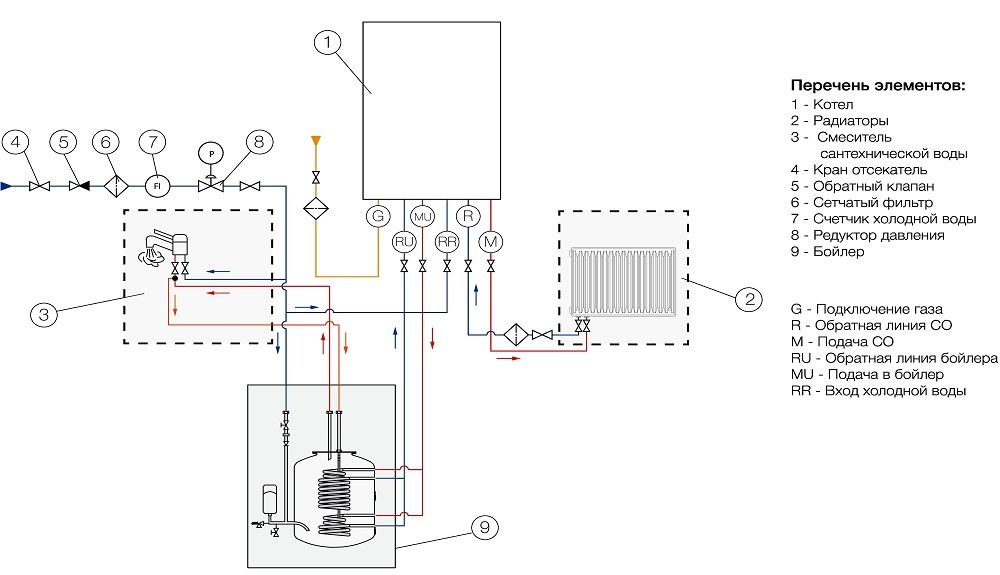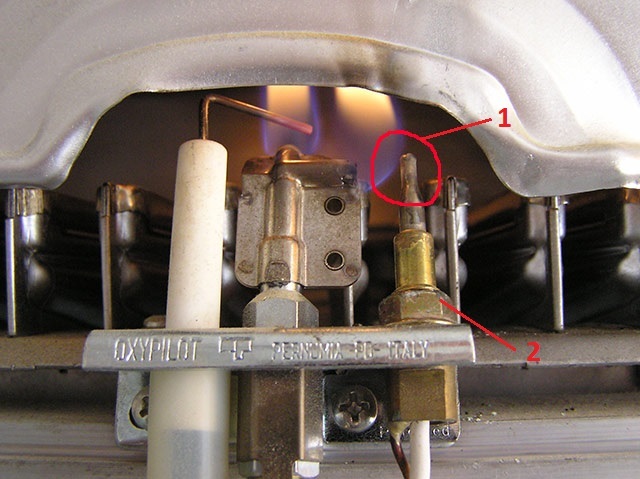Hot water supply is necessary for comfortable living conditions. Before choosing a water heater for a bathroom, consider its type and technical characteristics. This helps to correctly connect the hot water supply of a private house or apartment.
The content of the article:
-
Types of water heaters
- Storage water heater: advantages and disadvantages
- Instantaneous water heater
- Electric water heater
- Gas water heater
- Indirect heating boiler
Types of water heaters
Manufacturers produce models designed to provide hot water supply (DHW). They differ in design and type of energy carrier. All bathroom appliances are divided into several groups:
- Accumulative. The water is heated in a container.
- Flowing. Without tank.
- Electrical. The heating element is connected to an AC power supply.
- Gas. The water is heated with a gas burner.
- Indirect heating. The water is heated by the heating system.
The owner of a house or apartment himself decides which water heater is best for the bathroom. It takes into account the most accessible type of energy carrier.
Storage water heater: advantages and disadvantages
Devices of this type have a capacity in their design. Its volume is selected depending on the number of people using hot water supply. Usage storage water heaters provides for the presence of pressure in the water supply system. It is necessary to displace the contents from the tank.
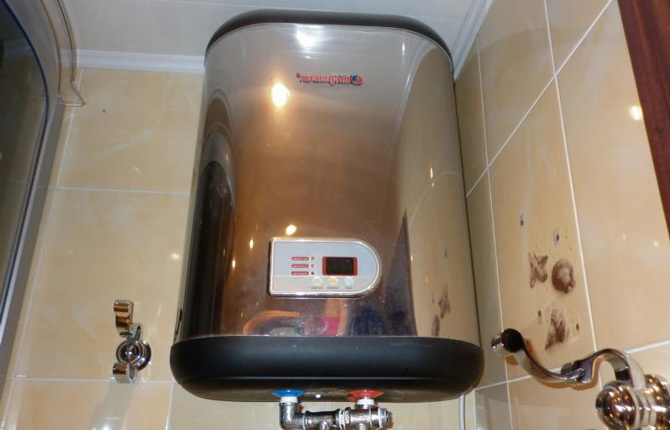
The temperature is constantly maintained within the specified limits by the thermostat. It reads data from the temperature sensor and, when the indicators change, turns on or off the heating. For safety reasons, manufacturers complete devices with a safety valve. It is necessary to relieve excess pressure that occurs during heating and expansion of the contents. The devices have pluses:
- The flow of liquid simultaneously to several points of the intake (bathroom, kitchen, etc.). The tank is connected to the DHW system.
- High fluid temperature. The indicator reaches 80 ° C, it is adjusted separately for each case.
- Possibility of installation at a great distance from the bathroom.
The disadvantages of storage-type devices include a long heating time. When the entire volume of water is consumed, it will take 60-180 minutes to warm up.
Instantaneous water heater
There is a selection of flow-through products on the market.
Their design provides for heating the liquid directly at the point of intake. Water flows through thin channels. At the same time, a powerful electric water heater heats up the flow. There is also gas instantaneous water heaters.
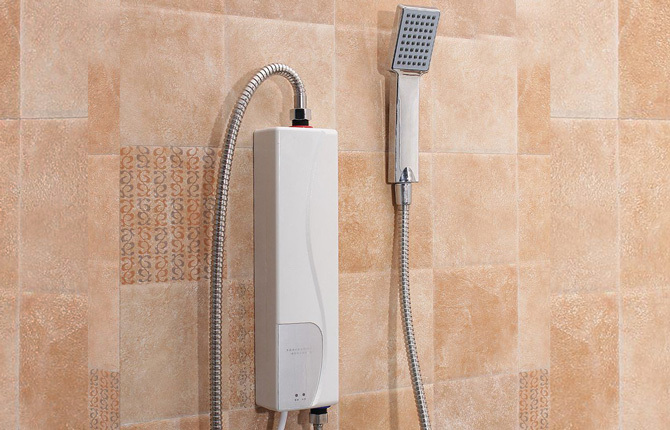
When choosing a boiler, pay attention to the technical characteristics of the cold water supply system. Manufacturers produce pressure and non-pressure models.
Heating in such water heaters is carried out using electricity or gas. The devices have pluses:
- High heating rate. Hot water in the bathroom does not run out.
- Small size. The dimensions of the devices allow them to be mounted in the smallest possible space.
- Ease of installation. The device is placed directly in the bathroom or near the water intake point.
Electric water heater
By cons flow electric models include the low water temperature and the need for powerful wiring. When passing through the channels, the water does not have time to heat up to a high temperature. A flow-through boiler is a high-power device. In order not to reduce the resource of the electrical wiring in the house or apartment, the device is connected with a separate wire to the shield.
To avoid electric shock, flow and storage models are grounded.
The negative consequences of using electric boilers are increased electricity bills. The advantage of this model is the possibility of installation in high-rise buildings, where the operation of gas equipment is prohibited.
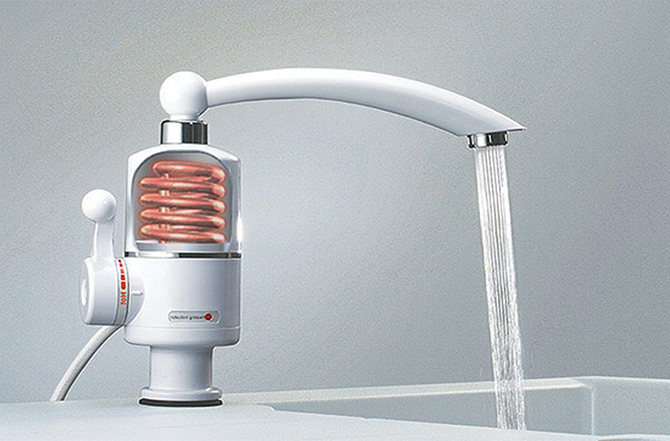
Gas water heater
Manufacturers produce devices that use gas as an energy carrier.
Depending on the model, the devices run on liquid fuel or use low pressure gas. Such bathroom water heaters can be divided into 3 groups:
- Accumulative type. They have a container for storing and heating liquids.
- Flowing. Heating is carried out by a burner.
- Combined. Warm water in the bathroom comes from the tap constantly, in order to reach a high temperature, the user needs to wait a certain period of time until the contents are heated.
The advantages of a gas water heater include the heating rate. When determining the power of the product, there is no need to take into account the technical characteristics of the household network. Products of different capacities can be installed in the bathroom.
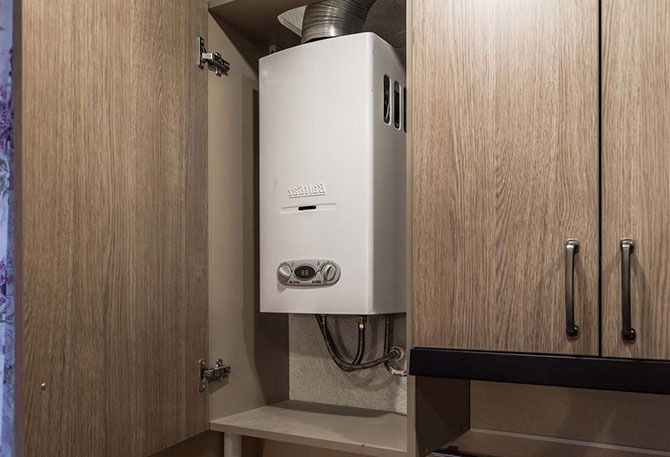
Disadvantages of gas equipment:
- Complexity of installation. For installation, you must use the services of specialists.
- The need to remove combustion products. To do this, equip a chimney. In some cases, its manufacture is associated with difficulties.
Indirect heating boiler
The design is a tank, the contents of which are heated by the heat carrier from the heating. It is used for hot water supply in summer cottages and private houses. A heat exchanger is installed in the tank, which is connected to the heating. The coolant circulates around the circuit and transfers some of the heat to the contents of the tank.
The advantage of the design is the connection of a large-volume container and its use at a distance from the bathroom. The boiler is installed in a separate room, with hot water circulating in the system. The water in the bathroom comes hot immediately after opening the tap.
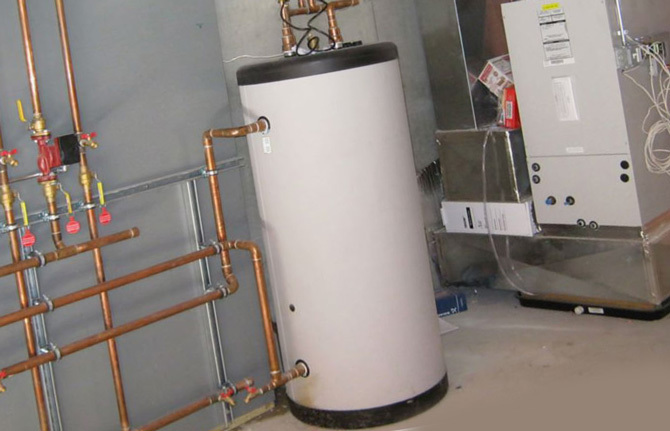
Flaw indirect heating boiler - the need for a heating boiler with a power reserve. This requires high energy costs.
The person himself chooses the type of water heater separately for each case. Models of different types have pros and cons. This is taken into account before purchasing the product. Which boiler do you use to provide hot water supply? What criteria did you consider when choosing? Share in the comments.
The video below will answer the questions: How to choose a water heater? Accumulative or flowing? Functions and features of the latter.

